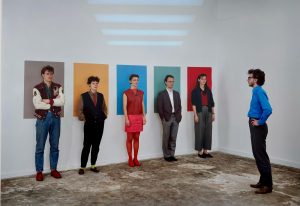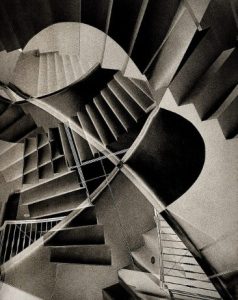
התערוכה Contact Warhol גדושה במאות צילומים ועשרות גיליונות קונטקטים (דפים שקדמו לפיתוח צילומים אנאלוגיים ,דפים שאפשרו לבחור את הרצויים לפתוח). עולה תמונה סוערת, מתוחה וכובשת של חייו ועולמו של אנדי וורהול בשנים 1976 – 1987, כלומר בעשור שקדם למותו. העשור הזה חפף לפריחה תרבותית ובחינת גבולות מגדר ופוליטיקה בארה”ב של פוסט ומלחמת וייטנאם וגם לצל הכבד, האפוקליפטי שהטילה מגפת האיידס שהכתה גם בעולם התרבות האמריקאי בעוצמה .

וורהול, עם מצלמה 35 מ”מ, יצר תיעוד שמזכיר במידה רבה את התיעוד שרבים, בעיקר בחלקים השבעים של עולם עושים , נכון לומר חיים, היום ומעלים לרשתות החברתיות. הוא צילום מקומות בילוי, אנשים קרובים וזרים , ואינספור דיוקנאות עצמיים שקדמו לסלפי של היום.

הסימונים של וורהול על גיליונות הקונטקט הם הצצות לתוך החשיבה, הבחירה והעריכה. .תחושת הבולמוס , המצב של הדימוי כמחליף את החיים עצמם , דקיקות המרחק בין המסמן למסומן, יחס תיעוד ובימוי, של הבניית זיכרון: כולן חלק מהדיון היומיומי שלנו שרירות לחלוטין בתערוכה שהצילום האחרון בה צולם לפני מעל שלושים שנה.
את תחושת המרחק ההיסטורי יוצרות הדמויות המצולמות בהן אמנים כמו קית הרינג וז’אן מישל באסקייה , מייקל גקסון, ליזה מינלי ודולי פרטון ודמויות פוליטיות כמו ננסי רייגן וארנולד שוורצנגר.
מבחינה טכנית, התערוכה מציגה את כל השלבים מצילומים להדפסי המשי אבל העניין בה נובע מהתכנים ומאופי פעולת התיעוד .
חלק ניכר מדימויים המוצגים נוגעים למגדר ולמין, בעיקר הומוסקסואלי, וניכרת גם תשומת הלב של וורהול לייצוג רב גזעי . האופן בו הוא מחלק את תשומת ליבו , מלהטט בין השמרני ביותר – רייגן, לכמעט פורנוגרפיה שהוא מצלם אקט מיני מרתק. כמו בקלישאה, מתוך כל העלייה התזזיתית עולה הדמות שלו עצמו כפגיעה, מוקסמת ותמהה על העולם.
Curators: Richard Meyer ,Peggy Phelan.
Cantor Arts Center , Stanford campus
להרשמה לניוזלטר הפרסומי השבועי של “החלון” בנושאי אמנות, אירועים ותערוכות חדשות
www.smadarsheffi.com/?p=925 (הרישום נפרד מהרישום לבלוג)
לפרטים על קבוצת סיורי הבוקר הנפתחת בסוף נובמבר או לסיור עומק לתערוכה “זמנים מודרניים”
עם דר’ סמדר שפי יום שלישי, 6 נובמבר 2018 (ערב) ,
שלחו Whatsapp ל 0507431106
או כיתבו לכתובת:

Contact Warhol: Photography Without End
The exhibition Contact Warhol comprises thousands of photographs and hundreds of contact sheets (pages of negatives printed before choosing the frame for larger prints used in analog photography). The overall impression that ensues of the life and world of Andy Warhol in the decade preceding his death (1976-1987) is a bustling, tense, and fascinating scene. This was the decade overlapping the cultural explosion and blurring of the borders of gender and politics in post-Vietnam War America. In addition, the dark, apocalyptic shadow of the AIDS epidemic which began in the late ‘70s, impacted the American cultural scene.
Using a 35mm reflex camera, Warhol created a documentary record which, to a great extent, is reminiscent of the contemporary documenting by so many people (especially from the well-off West) who constantly document their life and post on social media. Warhol photographed parties, close friends and strangers, and an infinite number of self-portraits all before the digital “selfie era.” His notations on the contact sheets provide insight into his thought processes, artistic decision-making and editing. The sensation of overdoing things, the status of the image as a substitute for life itself, of structuring memory, which all are part of the current discourse in contemporary Israeli art, are absolutely present in the exhibition at Stanford in which the last photograph was taken over 30 years ago.
The historical feeling of distance is created by the subjects of the photographs, among them artists such as Keith Haring and Jean-Michel Basquiat, stars such as Michael Jackson, Liza Minnelli and Dolly Parton, and political figures such as Nancy Reagan and Arnold Schwarzenegger.
A large section of Warhol’s images on display touch upon gender and sex, especially homosexuality, as well as the attention he paid to the representation of racial diversity. Warhol divided his focus, juggling between the most conservative (Reagan) on one extreme and almost pornographic explicit sexual acts in other photos. Like a cliché, his own image appears out of his constant frenetic activity as a fragile figure amazed at his surroundings.
Through Jan. 6, 2019
Cantor Arts Center at Stanford University, CA





